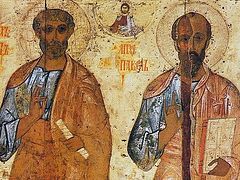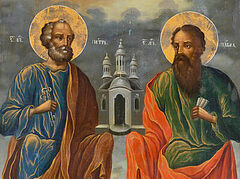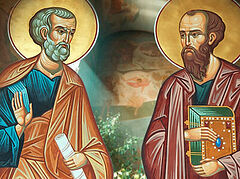In the name of Father, and the Son, and the Holy Spirit!
Today we celebrate the memory of the holy chief apostles Peter and Paul. To them a date in the Church calendar is dedicated, and this feast day is also ranked among what we call the great feasts. But the name “apostle” is also used in the hymns that touch upon the foundations of our Orthodox Church’s teachings on the faith. Thus, every day at Divine Liturgy we sing the Creed: “I believe in the One, Holy, and Apostolic Church.” The holy apostles placed the historical beginning of Christ’s Church in the upper room in Sion, and almost all of them sealed their labors with a martyric end. Sowers of the seeds of the Christian faith, they ignited the flame of faith in Christ in people’s hearts.
Can we imagine that from the preaching of Apostle Paul alone, three thousand men converted to Christ at the same time? To our consciousness subjugated to worldly vanity, bound by all manner of life’s cares, this may be totally incomprehensible. What a fire, what a fruitful seed this must have been to have had such a powerful effect. And the apostles preserved the true faith just as it was taught to them by Christ the Savior. This is however the historical side; but there is also a mystical side.
Occupying a historical place in the work of creating the Church, the apostles are the core, the backbone, and penetrating thread. That which we have seen and heard declare we unto you, that ye also may have fellowship with us: and truly our fellowship is with the Father, and with his Son Jesus Christ, we read in the Epistle of Apostle John (1 Jn. 1:3). For us, this is a commandment—to be in fellowship with the apostles, with all the apostolic ranks, and especially with those chief apostles who are the foundation of Christ’s Church. In the Roman Catholic church, there is the conviction that the Church was founded on only one apostolic foundation—the apostle Peter. But the Orthodox Church recognizes twelve apostles, directing attention to the words of Revelations. There we read about the city that comes down from the heavens, and the walls of the city, which has twelve foundations, and on which are written the names of the twelve apostles of the Lamb cf. (Rev. 21:14).
Why do we need such a living fellowship with the apostolic ranks, the foundation of the Heavenly City of the Church of Christ? From the time of the fall of Adam, according to the words of St. Macarius the Great, the children of this age are like wheat sown in the sieve of this earth, and are sown amidst the inconstant thoughts of this world, amidst the constant troubles of earthly affairs, desires, and multitudinous material concepts—thus is determined the algorithm of human life, which are bound in mind, heart, and other bonds to a life according to the spirit of this world. Satan scatters souls also by a sieve—that is, by earthly affairs. He sieves the entire human race, overwhelms it with seductive and sweeping thoughts. How familiar this state is to each of those Christians who are perhaps far from the faith, but strive attentively to peer into the depths of their hearts.
 Hieromonk Pavel (Shcherbachev)
Hieromonk Pavel (Shcherbachev)
And what about the apostles? The Lord foretold to them future attack on them by the evil spirits of darkness. They were not strangers to these battles, these temptations from the evil one, which have followed alongside the human race since the time of Adam’s fall. “Simon! Simon! Behold, Satan has desired to have you, that he may sift you as wheat. But I have prayed for you, that your faith would not fail” (cf. Lk. 22:31–32). The souls of the apostles, striving with their great faith for the Lord, tore from themselves those earthly passions and longings, having acquired a renewed love for God their Creator, Provider, and Redeemer. But, as it is written, Eye hath not seen, nor ear heard, neither have entered into the heart of man, the things which God hath prepared for them that love him (1 Cor. 2:9).
About what horizons does the apostle Paul speak in his Epistle to the Corinthians? About the horizons of human consciousness, perhaps even about some new system of coordinates? According to the opinion of a number of holy fathers, even the prophets and kings of the Old Testament did not know such lofty gifts as the apostles were vouchsafed, and through them, all Christians; they did not know what close fellowship and unity with God they will have; what unearthly joy they will be vouchsafed, having been vested with power from on high. “You shall be partakers of the divine nature” (cf. 2 Peter 1:4), says the apostle Peter in his Epistle.
We read about allegorical actions in the Holy Scripture of the Old Testament. Thus, the high priest took two birds, sacrificed one of them, and sprinkled the other with the blood of the sacrificed bird and released it into the heavens. This, according to the explanation of the holy fathers, talks about the redeeming feat of the Savior, through Whose blood the souls of renewed mankind, renewed through the apostolic preaching of God’s word, will be released from the many threads of our earthly sojourn and mental sea that bind us. But if the apostles had only spoken words about Christ, about Gospel values and Gospel commandments, then this would not have been a complete testimony—because the apostles witnessed to all that they preached, through their feats of confession of the faith. Required were not only words, but also witness to Christ through their lives. And we hear about witness to the Divinity of Jesus Christ in the words of today’s Divine Gospel reading, in which Peters confesses Christ as the Son of the Living God.
In the domes of our beautiful church, we see the faces of the New Martyrs; and those who read Church history apply this perception to ancient times, when many Christians, followers of the apostles, died as martyrs. Perhaps we are approaching times when this will be not yesterday but today. Look at what is happening in the Ukraine. What horrors are taking place there! What sacrilege! What a triumph of the kingdom of darkness, when some want to give the relics of holy God-pleasers who performed great ascetic labors and left us an example of how a person can unite with Christ in this life, to some European museums, to scatter them all over the world, where people might laugh at them and blaspheme against them.1
The apostolic calling of all Christians is to witness to the truth of the Savior’s words through their whole lives, as his beloved disciple Peter witnesses to Him in the Holy Gospel. And the apostles’ entire life, and the whole triumph of their great labors is a direct instruction to us.
This is primarily achieved through their words. If we want to have that fellowship about which the apostle Paul spoke, with them, and through them with the Living God, then we ourselves should be living images of these apostles. They enlightened the whole world with their teachings, and brought us to Christ.
But is this what we see in the reality surrounding us? Do many of us thoughtfully and reverently read the Scriptures? And do many of us strive to understand them, apply efforts in order to pass these God-inspired words not through the often distorted prism of our consciousness, but check them with the opinion of the holy fathers, so that this would be made sure according to a certain standard that cannot be subject to doubt. How often we leave in total indifference the Word of God, living and active, abiding through the ages, and reject eternity, cleaving to what is inescapable according to the law of this existence—death. This Word penetrated to the most hidden thoughts of the soul and reveals them with all clarity, as the apostle Paul said in his Epistle to the Hebrews. Instead of this, we turn our attention to wisdom according to the elements of this world.
Perhaps today’s feast will be for us, brothers and sisters, a cause to think first of all about being at least a little responsible for the preservation and study of that great inheritance left to us by the holy apostles, and first of all the chief apostles Peter and Paul, who reveals to us divine wisdom, hidden both throughout the world and in in the life of each person. Amen.





